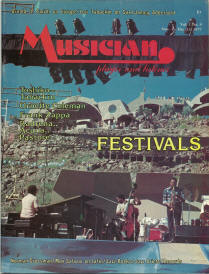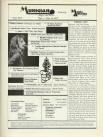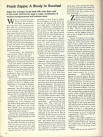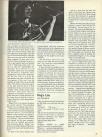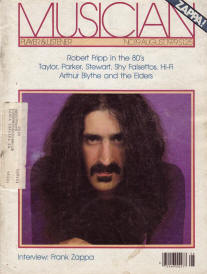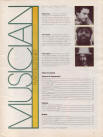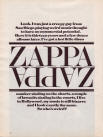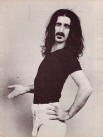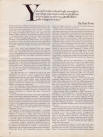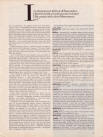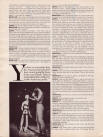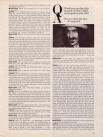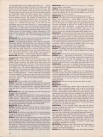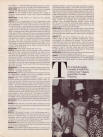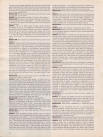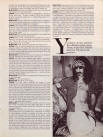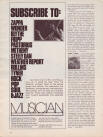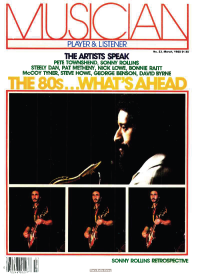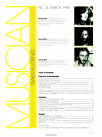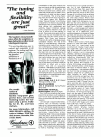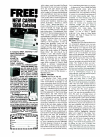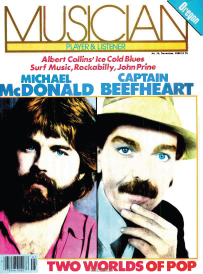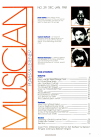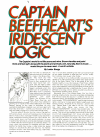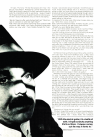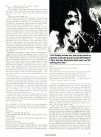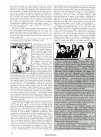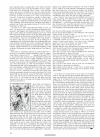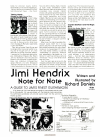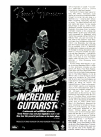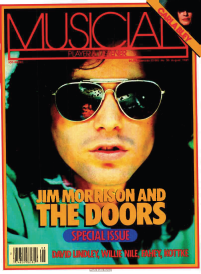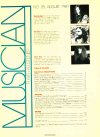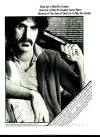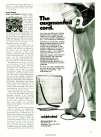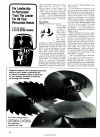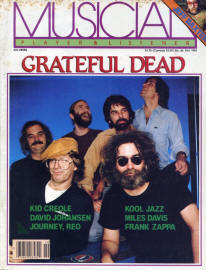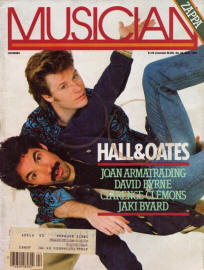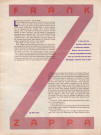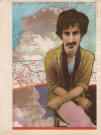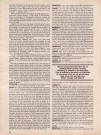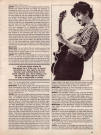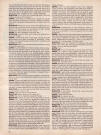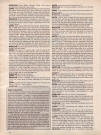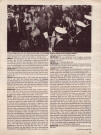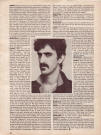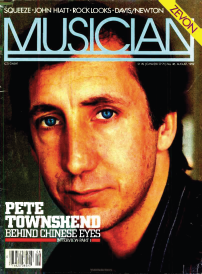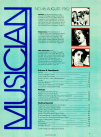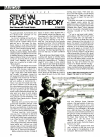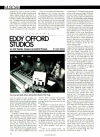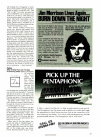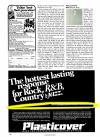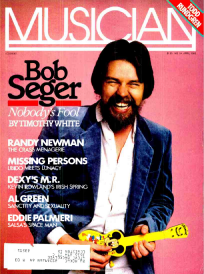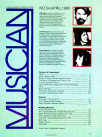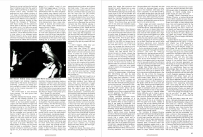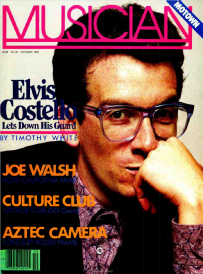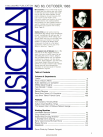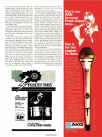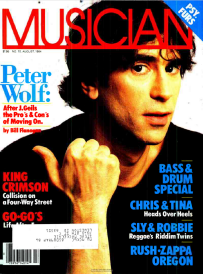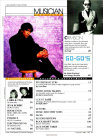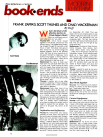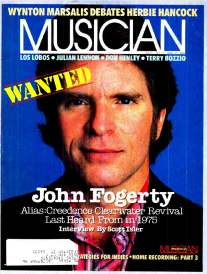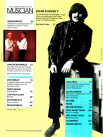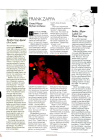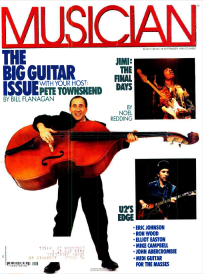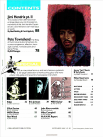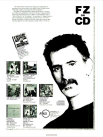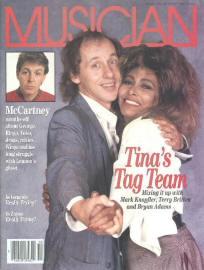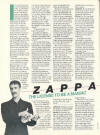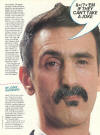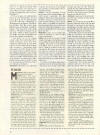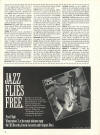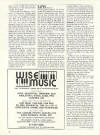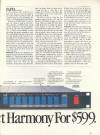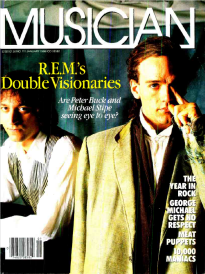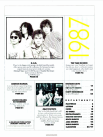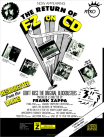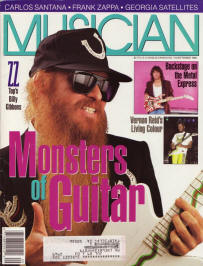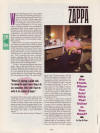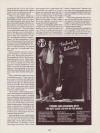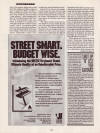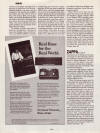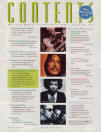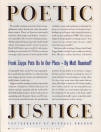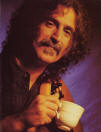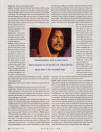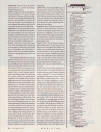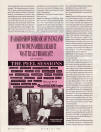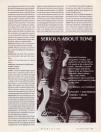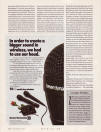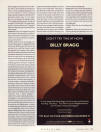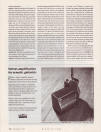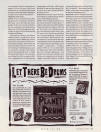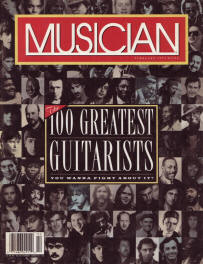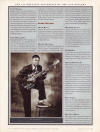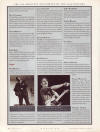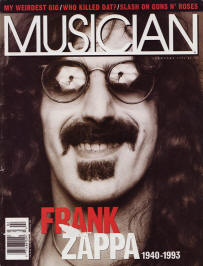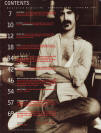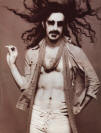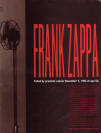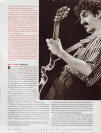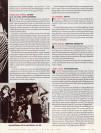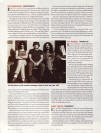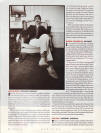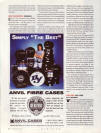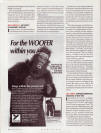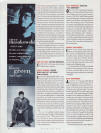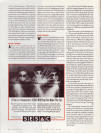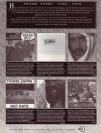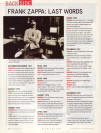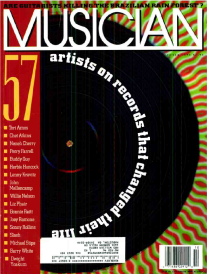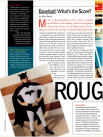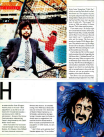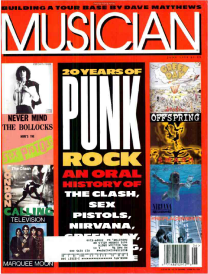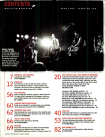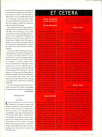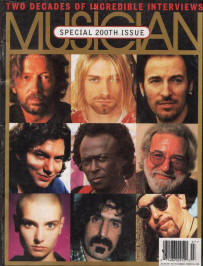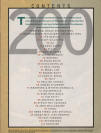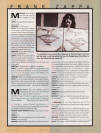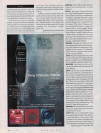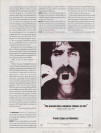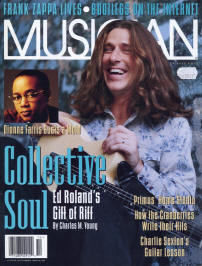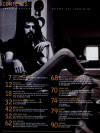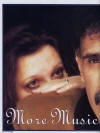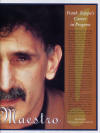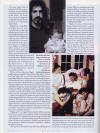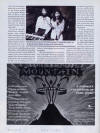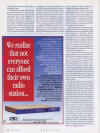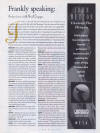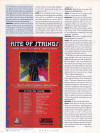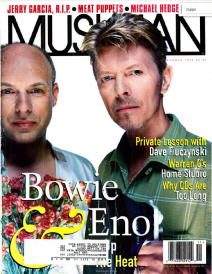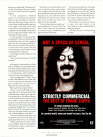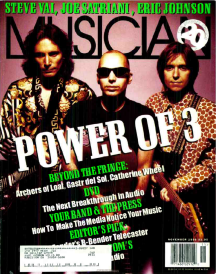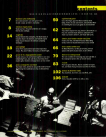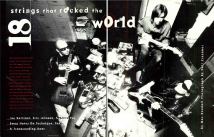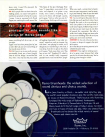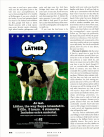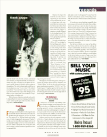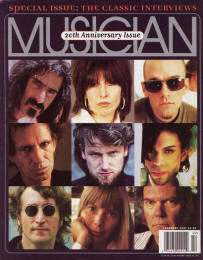Musician
When you think about Frank Zappa you have to admire the ability the man has to get things done. Every musician must have some sort of business head even if it is knowing when to nod yea or nea to his manager's whims. Actually, it takes a good business sense just to find a decent manager anymore. Imagine what it must have been like for young Frank Zappa trying to talk labels into signing the Mothers of Invention back in 1964 (when fusion had something to do with the bomb). Not only did he do it but he managed to get rock's first conceptual double album released as his first lp. How?
"It wasn't easy. I just talked like a son-of-a-bitch. Before they knew it they had two records in the pile." (read more)
Source: Javier Marcote
MUSICIAN: Was Cruising With Ruben & The Jets a parody of the 50s then, or was that a serious attempt to play in that style?
ZAPPA: I'll tell you, there's a very scientific reason for the existence of Ruben & The Jets. The closest relationship between that album as an artistic event and another event from a different field that you can compare it to would be the point in Stravinsky's career in which he decided he was going to write neo-classical music. He started doing stuff like Pulcinella – writing music in his day and age, but using forms that were thoroughly out of style and frowned upon by the academic establishment. You have to remember that the American people don't have much going for them in the way of taste. I mean, taste is something that's inflicted on the American public by other outside forces. So if somebody tells you that something is cool, well, you'll think it's cool and you'll go out and buy it. To make an album like Cruising With Ruben & The Jets at that time in history, in '68, was very unfashionable. And everybody went, "Oh, I can't own that; it's not cool. It's not acid rock, it's not fuzztone, it's not psychedelic. Who needs this?" I didn't do it just to be arbitrary – I like that kind of music, and I wanted to have some examples of that style in my total catalog output. (read more)
Frank Zappa — Joe's Garage Act I Zappa Records. SRZ 1-1603.
Uncle Frank wants to tell you a bedtime story that is a concoction
of fantasy and truth leaving you to distinguish between the
two. The plot revolves around the "Central Scrutinizer," a big
brother figure who "enforces laws that haven' been passed yet.”
Zappa also attempts to take the heat off the "Jewish Princess"
fiasco by demonstrating his patriotism as an equal opportunity
satirist and offering his outside insights into "Catholic Girls"
where he asks the enticing question, "do you know how they go?”
On the musical side, the arrangements bear Zappa’s trademark:
as he applies rhythmic variation percussive tinkling and even
finds time for some hot guitar playing on the instrumental "Toad-O-Line."
Though I wouldn’t regard "Joe's Garage" as [...tition)] the
music serves it's purpose as a backdrop for Act I of this zany
audiotheatric production.
Source: worldradiohistory.com
Sex. How can something that's supposed to be so natural, such a pleasure, such fun, be such a godawful BITCH? Here are three albums that explore the question. (read more)
Source: worldradiohistory.com
1980 December
No. 29
Captain Beefheart's Iridescent Logic
By Lester Bangs, pp 40-44, 46
Captain Beefheart and His Magic Band: Doc at the Radar
Station
By Jon Pareles, pp 70, 72
That's right, folks – it's another album by Frank Zappa. If it occurs to some that the market has been glutted with Zappa product since he severed ties with Warner Bros., it's only because he has released two double albums and one single LP on his own Zappa Records while WB almost simultaneously unleashed Studio Tan, Sleep Dirt and Orchestral Favorites – all in the past two and a half years. (read more)
Source: worldradiohistory.com
Several years ago ... five maybe ... the people who promote our rock shows in Vienna (Stimmen der Welt) approached me with the idea of doing a concert in Vienna with the Vienna Symphony. I said okay. After two or three years of pooting around with the mechanics of the deal, work began on the final preparations. The concert was to be funded by the City of Vienna, the Austrian Radio (ORF), the Austrian Television (ORF), and a substantial investment from me (the cost of preparing the scores and parts). (read more)
Source: Charles Ulrich
MUSICIAN: At this point in your career, do you now, or have you ever, thought of retiring or staying off the road?
ZAPPA: No, I get pissed off at a lot of aspects of the business, but the idea of stopping writing or playing music has never occurred to me. As far as touring goes, there have been times on a tour where I said, "Good god, who booked this thing?" Because the scheduling was just so murderous. But the curious thing about that attitude is, those feelings all occurred during the times I was doing interviews. See, before I stopped doing print interviews a year ago, I would go on a tour and do an average of five interviews a day, either by phone or in person. And on days off, you just want to lay down and relax, because you want to save your energy to do a good job for the show. But when you have to sit there and answer questions, it gets you pissed off after a while. So after that one particular tour, where they just had me talking my ass off, the clipping service sent me this bundle of clippings that resulted from all the work I had done on the tour... and it was pathetic. I mean, I couldn't believe how I was misquoted, and all the crap that was in the papers, and I said, "Do I need this? No way." So I decided I'm not going to do it anymore. And I stopped, did another tour with no interviews ... I had the time of my life. I said, "Why have I been busting my ass for sixteen years doing all this stuff to net two pounds of paper at the end of the tour?" I had a great time on this tour too, because I only did a few interviews. And this is the longest and probably roughest tour we ever did in the United States – it still was pretty fun. (read more)
1982 August
No. 46
Steve Vai. Flash And Theory
By Dan Forte, pp 80, 82
Zappa: Ship
Arriving Too Late To Save A Drowning Witch
By Dan Forte, pp 97-98
So one time like Frank Zappa was gonna go on tour, y'know, like back before he got real big. And his wife Gail was like eight months pregnant, so she goes, "What do you want to name the baby?" 'Cause he was gonna be gone on tour when it was gonna be born. So he's like walking out the door and goes, "If it's a boy name it Motorhead, if it's a girl name it Moon Unit." (read more)
Source: worldradiohistory.com
What's the Role of the Rhythm Section in Frank Zappa's Music? Both go wide-eyed, point at each other and say "you start!" (read more)
Source: worldradiohistory.com
Here we are in Frank Zappas "funless 80s" and where, oh where, has our Grand Wazoo gone? Off attempting to sustain a career as a serious composer, he says with chagrin. (read more)
Source: worldradiohistory.com
It's a sweltering early summer Sunday afternoon, and all's well on the homefront at the Laurel Canyon HQ/fortress, chez Zappa. Mom is in the kitchen fetching beverages for the various guests or popping into the editing room, where Frank sits smugly with a couple of nicely-dressed women from Money magazine. There they sit, humbly listening to a playback of Zappa's most recent effort, ostensibly for public radio – an unrepentantly hard-edged, over-the-top urban pastiche with comic Eric Bogosian. There are nervous giggles and pinched guffaws in the room as the air quivers with rapid-fire lewdness covering such redeeming topics as castration, phone sex, racial slurs, sexist jibes and other garden variety gonzo filth. (read more)
Source: zappateers
What's the shortest book in the world? How about The Directory of Hot Guitarists with Good Musical Taste? Think about it. The title may be longer than the book. But one thing's certain: Frank Zappa's name would have to figure prominently in it. How many other acrobatic axemen have consistently sidestepped both metal overkill and fusion flatulence in their pursuit of the perfect extended solo? How many technically dazzling guitarists can you name who can even write all their own goddamn material – good material, mind you – much less produce it? Okay, okay; maybe there's a few besides Zappa. But not many. (read more)
1991 November
No. 157
Poetic Justice
Frank Zappa Puts Us In Our Place
Interview by Matt Resnicoff, 10 pp 66-68, 70, 72-77
MUSICIAN: You don't miss playing guitar?
ZAPPA: Not really. I'm faced with a bit of a dilemma which is going to smack me right in the face on Thursday. I'm going to Czechoslovakia and Hungary, and I've been invited because they're having big celebrations. The last Russian soldier leaves Czechoslovakia on the 24th and Hungary on the 30th, and they want me to bring my guitar over and play. And I haven't touched it for years. I don't have any calluses! I don't know what to do with that fucking thing. And if I don't take it along with me I know a lot of people will be disappointed, but I know if I plug it in they're going to be even more disappointed, [laughs] 'cause I can't play anymore. (read more)
Frank Zappa
Zappa's music is not about complexity as much as creative composition,
and with his hands full of scores, parts to arrange and checks
to sign, it's small wonder he assigned his "impossible"
parts to stunt players like Steve Vai while reserving his own
guitar for searing, slicing improv. The segues between songs
he performed would generally consist of anarchic modal lines
transponded via the most thrilling Strat and SG tones imaginable.
Zappa combines monstrous facility with unfettered abandon.
1994 February
No. 184
Frank Zappa
Felled by prostate cancer December 4, 1993 at age 52
Mark Volman, Pamela Des Barres, Cal Schenkel, Pierre Boulez,
Jimmy Hayes, Ruth Underwood, Sal Marquez, Bruce Fowler, Adrian
Belew, Warren Cuccurullo, Don Rose, Chad Wackerman, Yoko Ono,
Mike Keneally, Joel Thome, Don Van Vliet, Daniel Schorr, Matt
Groening
Interviews by Scott Isler, Jim Macnie, Kristine McKenna, Mark
Rowland, Roy Trakin and Josef Woodard, pp 18-22, 24, 26, 28,
30
Frank Zappa: Last Words
From Musician interviews by James Riordan, Dan Forte,
Tom Moon, Scott Isler, Josef Woodard, Alan di Perna and Matt
Resnicoff, p 82
The International Astronomical Union's Minor Planets Center
has named an asteroid for Frank Zappa. The honor was the brainchild
of Zappa admirer John V. Sciatti, a psychiatrist from Phoenix,
who marshalled support on the Internet from fans in 17 different
countries and found a sympathetic ear in Brian Marsden, director
of the Minor Planets Center, who had himself once prodded his
colleagues into naming an asteroid after Duke Ellington. Frank's
piece of the belt – titled Zappafrank, so as not to be confused
with the asteroid Zappala – was discovered in 1980 by astronomer
L. Brozek of the former Czechoslovakia, underscoring Zappa's
long friendship with Czech leader Vaclav Havel.
Other musicians who have been honored include the four individual
Beatles, Eric Clapton, Mike Oldfield and many classical composers
famous and obscure. (A complete listing of the 4000-plus titled
asteroids can be found in the Dictionary of Modern Planet Names
by L.D. Schnnadel, published by Springer-Verlag.) Marsden says
the Center is always open to suggestions, but
cautions that the board tends to favor musical accomplishment
over pop glamor. In other words, no JacksonJanet? "I don't think
we'd welcome that," Marsden agrees dryly. Or her brother."
Source: worldradiohistory.com
Civilization Phase III could be the most [chaotic ?] engine, moving work in Frank Zappa's monumental oeuvre. What's more, it's not available in any store! (Call 818-PUMPKIN - operators are standing by.) Mail-orderers will receive an exquisitely packaged two-CD set. Its music is created on Synclavier aid by The Yellow Shark's Ensemble Modern. Its madness was created by newly exposed bits of nutty dialogue from 1967's Lumpy Gravy (plus a Next Generation of '90s voices) in service of surreal scenario about social stupidity, religious charlatanism and political evil. Zappa's instrumentals spin more scenarios still, like the dark piano fantasia of "They Made Eat It," the mesmerizing woodend song "Gross Man," or the plaintive pulsations of "Amnerika." Grand finale "Beat the Reaper," a series of restless themes, is [intervowen ?] taken by commonplace noises: rain, motor vehicles, gunfights, etc. Ultimately, all you can hear are random sounds from the disordered world that Zappa left behind.
Source: worldradiohistory.com
1995 October
No. 203
More Music Maestro
By Dan Forte, pp 52-54, 56-58
Frankly Speaking: Interview with Gail Zappa
By Dan Forte, pp 59-60
On pages 18-32 is the cover story, interview with Steve Vai, Joe Satriani and Eric Johnson. Page 30 has the following snippet:
VAI: Some people have no choice but to be
walking poetry, no matter how good or bad they're perceived
to be by the masses. I mean, I was so enamored with Frank Zappa;
just watching him walk around the room, everything he'd do or
say – it was just right.
Zappa must have been pretty fond of you as well. After all,
you were transcribing all that wacky music for him.
VAI: He'd sum it up in one small sentence occasionally, throw
you a bone [laughs]. One of the first things I transcribed for
him, when I was 18, was this piece called "The Story of the
Jazz Discharge Party Hats." I wrote down every pitch of his
voice and adapted it to guitar: every breath, every scratch,
everything. So I went to his house and brought a guitar, and
he goes, "Let's see what you can do." I started doing this thing,
and he just started laughing hysterically. I was really nervous;
I wanted so much to impress him with how I was playing his music,
and I thought that I was blowing it. My God, I was dying. And
then he gets on the phone and he goes, "Gail, come down now!
You have to see this!" [laughter] I'd nailed it, and he was
actually really impressed. [pause] Then he made me double it.
[laughter]
Source: worldradiohistory.com
1997 February
No. 219
Special Issue: the Classic Interviews
Excerpt from the August 1979 interview
by Dan Forte, p 35
Dweezil Zappa: Home Studio
By David John Farinella, pp 104-106
Look, the thing about people saying whether something is
shit or it's wonderful is irrelevant to the thing being discussed.
Neither one of our opinions matters.
But would't you say that there's got to be some music-
That's total shit? No! Absolutely not. Because there's always
somebody that likes it even if it's just the guy himself who's
playing it and he's entitled to love it, and he's entitled to
be as good as he thinks he is. Whatever we say about it doesn't
make any difference, because we don't know what went into the
manufacture of it. A garage band that plays a one-chord song,
and plays the fuck out of it because they're straining to fulfill
100% of their understanding of the E major chord of the guitar,
has achieved something spectacular in the day before if they
couldn't even make an E major chord on the guitar.
Do you think the image that the media has of you is very
accurate?
No, but it's irrelevant.
But there is an image.
Oh yeah, there's definitely an image. But I think that if anybody
was ever to manifest an exact replica of the kind of person
I really am and stick it in the newspapers, I don't think people
would bother with it. Because what's exciting about a guy who
gets up in the morning and sits at the piano and writes little
ballpoint pen notes on a piece of paper, and then goes to bed?
You know what I do when you leave here? I go back to the piano
until it's time to go to bed. There's nothing exciting about
that. It's better to have people thinking that I'm out being
totally crazy – because that's exiting.
